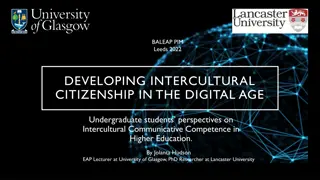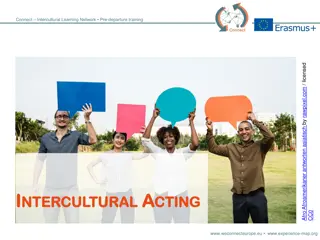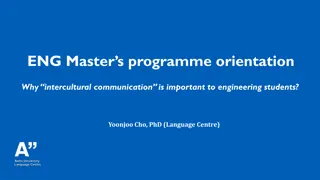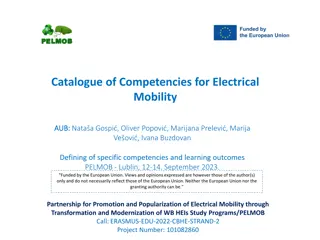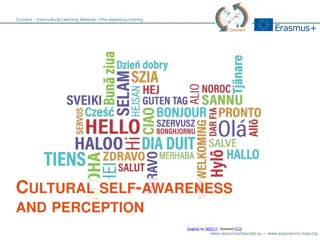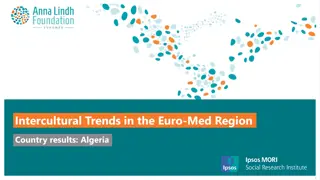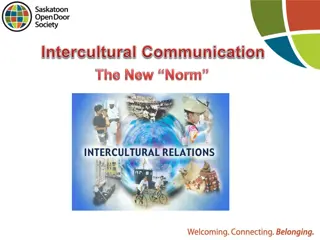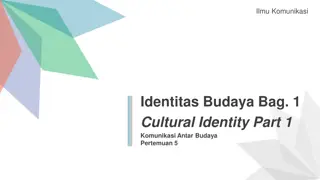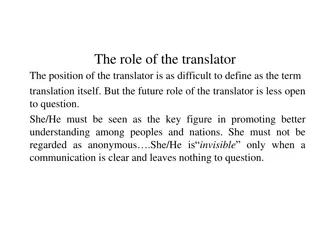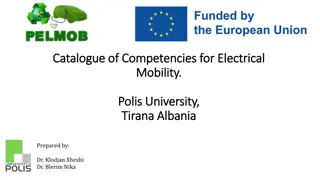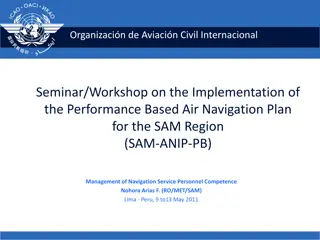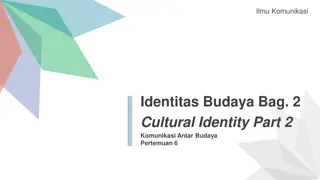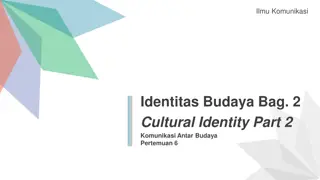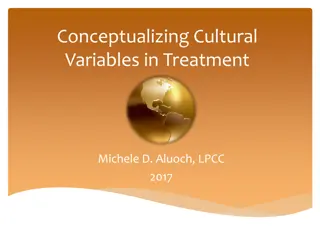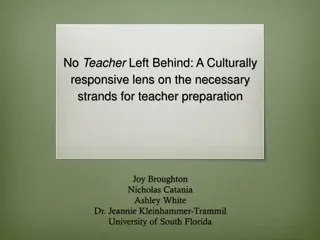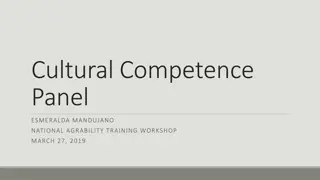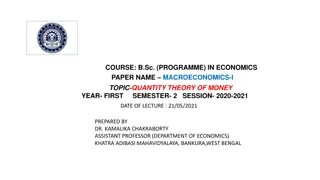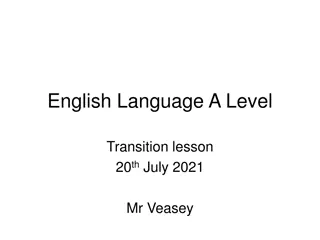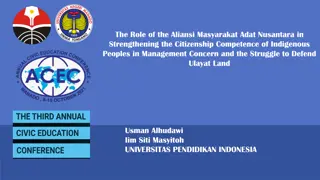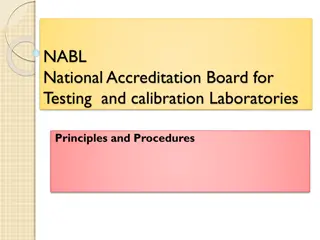Understanding Intercultural Competence: Definitions and Perspectives
Exploring the concept of intercultural competence, this article delves into definitions, misconceptions, and comparisons with related terms like acculturation and multiculturalism. The importance of intercultural sensitivity in developing competence is highlighted, emphasizing the need for a deeper understanding of diverse cultures for effective communication and collaboration.
- Intercultural competence
- Diversity
- Cross-cultural communication
- Global citizenship
- Cultural sensitivity
Download Presentation

Please find below an Image/Link to download the presentation.
The content on the website is provided AS IS for your information and personal use only. It may not be sold, licensed, or shared on other websites without obtaining consent from the author. Download presentation by click this link. If you encounter any issues during the download, it is possible that the publisher has removed the file from their server.
E N D
Presentation Transcript
(Re-)defining Intercultural Competence. What is it, or maybe, what is it not? Christina Laporda EAP tutor, UCLan University PhD student, UCLan University MA in TESOL with Applied Linguistics claporda@uclan.ac.uk LinkedIn: christinalaporda
how can we figure out how to impart something as subtle and intangible as intercultural competence ? Do we even know what the term really means? (Bok, 2009) Introduction it is essential to arrive at a definition of intercultural competence before proceeding with any further assessment steps. (Deardorff, 2009, p.478) 28/09/2024 Christina Laporda 2
Comparing terms and definitions Early research in intercultural competence, acculturation and adaptation studies: cross-cultural adaptation, cross- cultural adjustment/effectiveness = were used to describe what we now call intercultural competence adaptation(operating effectively without losing one s cultural identity) while intercultural competence is an important part of adapting to a new culture, it is conceptually distinct. (Arasaratnam, 2016, p.2) assimilation(giving up one s cultural identity and taking on the worldview of one s host) (Arasaratnam, 2016; Bennett, 2004; Spitzberg & Changnon 2009) 28/09/2024 Christina Laporda 3
Comparing terms and definitions Acculturation has been defined as culture change that results from continuous, first-hand contact between two distinct cultural groups . (Redfield et al., 1936, as cited in Berry, 1992, p.69) Whereas multiculturalism aims to discover and tolerate people from different cultures, who live peacefully side by side, the prefix inter implies relationships, interaction, and exchange. (Portera, 2017, p.24) biculturalism represents comfort and proficiency with both one's heritage culture and the culture of the country or region in which one has settled. (Schwartz & Unger, 2010 p.27) global citizenship means possessing the values, ethics, identity, social justice perspective, intercultural skills, and sense of responsibility to act with a global mindset. (Brigham, 2011, p.18). Conceptually, intercultural competence is not equivalent to acculturation, multiculturalism, biculturalism, or global citizenship although intercultural competence is a significant aspect of them all. (Arasaratnam-Smith, 2017) 28/09/2024 Christina Laporda 4
Intercultural Sensitivity Intercultural Sensitivity the Developmental Model of InterculturalSensitivity (DMIS) (Bennett, 2004) greater intercultural sensitivity creates the potential for increased intercultural competence. (Bennett, 2004, p.74) 28/09/2024 Christina Laporda 5
Definitions of Intercultural Competence (IC) the appropriate and effective management of interaction between people who, to some degree or another, represent different or divergent affective, cognitive and behavioural orientations of the world . (Spitzberg and Changnon, 2009, p.7) intercultural competence is broadly about communication and behaviour that is both effective and appropriate in intercultural interactions (and all interactions can be considered to be intercultural) . (Deardorff, 2014) 28/09/2024 Christina Laporda 6
Effective and appropriate Effectiveness: successful achievement of one s goals in a particular communication exchange (notably individualistic in its orientation). Appropriateness: views the communication exchange from the other person s point of view, as to whether the communicator has communicated in a manner that is (contextually) expected and accepted. (Arasaratnam, 2016) the appropriate and effective management of interaction between people who, to some degree or another, represent different or divergent affective, cognitive and behavioural orientations of the world. [ ] The extent to which individuals manifest aspects of, or are influenced by, their group or cultural affiliations and characteristics is what makes an interaction an intercultural process. (Spitzberg and Changnon, 2009, p.7) 28/09/2024 Christina Laporda 7
Intercultural competence is not There are people who may never develop intercultural competence Guaranteed developed by simple exposure to diversity we can t rely on immersion it must be intentionally addressed through the curriculum and experiential learning, there is no point in time where we can claim we have become fully interculturally competent fully achieved (Deardorff, 2014; Gregersen-Hermans, 2017; Lantz-Deaton, 2017; Liang & Schartner 2020) 28/09/2024 Christina Laporda 8
Intercultural competence is Intercultural competence is - A learning process, and the learning happens over time An ongoing process (Deardorff, 2009) A lifelong commitment (Arasaratnam-Smith, 2017) A lifelong developmental process (Deardorff, 2014) An essential lifelong competence (Deardorff, 2014) - A set of knowledge, attitudes, skills and behaviours (Gregersen-Hermans, 2017) - - - Attitudes: respect, openness, curiosity and discovery Knowledge: cultural self-awareness, cultural knowledge, sociolinguistic awareness Skills: listen, observe, evaluate, analyse, interpret, relate - - Desired Internal outcomes: adaptability, flexibility, ethnorelative view, empathy Desired external outcome: effective and appropriate communication & behaviour in an intercultural situation Process Model of Intercultural Competence (Deardorff, 2006) 28/09/2024 Christina Laporda 9
Intercultural competence is Intercultural competence is - A combination of one s personal abilities and relevant contextual variables (Arasaratnam, 2016) - Particular to each context (Heleta & Deardorff, 2009) In every context, we need to understand the historical, political, religious, economic, geographical, emotional, and societal dimensions, we need to understand the competencies needed to navigate successfully within this context (especially within post-conflict settings). (Heleta & Deardorff, 2009, p.57) 28/09/2024 Christina Laporda 10
Re-defining Intercultural Competences if what is being studied is effectiveness and appropriateness in intercultural communication (each of these terms in turn need to be unpacked to check for conceptual equivalency), then one can conclude that it is a study of intercultural competence, regardless of what it is called. (Arasaratnam, 2016, p.4) With respect to education and intercultural competences, in our era of globalization and global interdependence, regardless of the adjectives we use, there is a desperate need at a local and global level for specific competences that better enable citizens to manage their ever-changing realities. There remains a need for methodologically appropriate research on ICs, and a necessity for educational theories and practices that help citizens recognize, value and manage any form of diversity and cultural change. (Portera, 2017, p.43) 28/09/2024 Christina Laporda 11
References Arasaratnam, L. (2016). Intercultural Competence. Oxford Research Encyclopedia Of Communication. https://doi.org/10.1093/acrefore/9780190228613.013.68 Arasaratnam-Smith, L. A. (2017). Intercultural competence. An overview. In Intercultural competence in higher education: International approaches, assessment and application (pp.7-18). Routledge. Atkinson, D. (1999). TESOL and Culture. TESOL Quarterly, 33(4), pp.625-654. Bennett, M. J. (2004). Becoming interculturally competent. Toward multiculturalism: A reader in multicultural education,2, 62-77. Berry, J. W. (1992). Acculturation and adaptation in a new society. International migration, 30, 69-84. Bok, D. C. (2009). Forefront. The SAGE handbook of intercultural competence. (pp.ix-x). Sage. Brigham, M. (2011). Creating a global citizen and assessing outcomes. Journal of Global Citizenship & Equity Education, 1(1), 15-43. Byram, M. (2021). Teaching and Assessing Intercultural Communicative Competence (2nd ed.). Multilingual Matters. Deardorff, D. K. (2006). Identification and Assessment of Intercultural Competence as a Student Outcome of Internationalization. Journal of Studies in International Education, 10(3), 241 266. doi: 10.1177/1028315306287002 Deardorff, D. K. (2009). Implementing intercultural competence assessment. The SAGE handbook of intercultural competence, 477-491. Deardorff, D. K. (2014). Some thoughts on assessing intercultural competence. Urbana, IL: University of Illinois and Indiana University, National Institute for Learning Outcomes Assessment (NILOA). 28/09/2024 Christina Laporda 12
References Gregersen-Hermans, J. (2017). Intercultural competence developments in higher education. In D.K. Deardorff & L.A. Arasaratnam- Smith,Intercultural Competence in Higher Education. International Approaches, Assessment and Application (pp.67-82). Routledge. Heleta, S. and Deardorff, D.K. (2017). The role of higher education institutions in developing intercultural competence in peace- building in the aftermath of violent conflict. In Intercultural competence in higher education: International approaches, assessment and application (pp.53-63). Routledge. Hofstede, G. (2011). Dimensionalizing Cultures: The Hofstede Model in Context. Online Readings in Psychology and Culture, Unit 2. Retrieved 03 December 2021, from http://scholarworks.gvsu.edu/orpc/vol2/iss1/8 Janssen, P. T. H. M. (2019). Intercultural competences (1st ed.). Noodrdhoff Uitgevers. Lantz-Deaton, C. (2017). Internationalisation and the development of students intercultural competence. Teaching in Higher Education, 22(5), 532-550. Liang, Y., & Schartner, A. (2022). Culturally mixed group work and the development of students intercultural competence. Journal of Studies in International Education, 26(1), 44-60. Medina-L pez-Portillo, A., & Sinnigen, J. H. (2009). Interculturality versus intercultural competencies in Latin America. In The SAGE handbook of intercultural competence (pp.249-263). SAGE Publications, Inc. Portera, A. (2017). Necessity and Urgency of Intercultural Education and Intercultural Competences. In Intercultural education and competences: Challenges and answers for the global world. (pp.23-45). Cambridge Scholars Publisher. Spitzberg, B. H., & Changnon, G. (2009). Conceptualizing intercultural competence. In The SAGE handbook of intercultural competence, pp. 2-52. Schwartz, S. J., & Unger, J. B. (2010). Biculturalism and context: What is biculturalism, and when is it adaptive?: Commentary on Mistry and Wu. Human development, 53(1), 26-32. 28/09/2024 Christina Laporda 13
Thank you! Thank you! 28/09/2024 Christina Laporda 14


